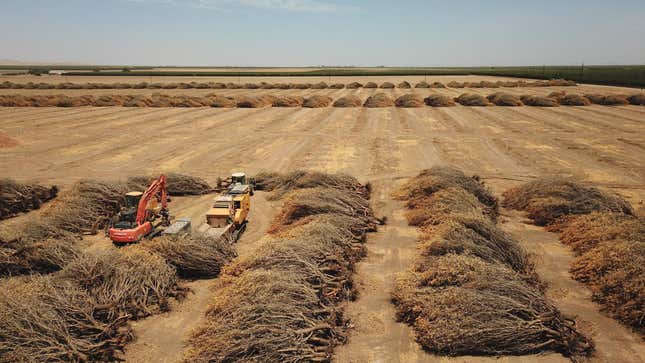
Amid water shortages during a historic megadrought, California regulators have moved to restrict thousands of farmers’ access to water.
California’s State Water Board unanimously approved an unprecedented emergency order on Tuesday that would prohibit some Central Valley farmers from irrigating their crops using water diverted from rivers and streams in the Sacramento and San Joaquin River watersheds. Pending final approval by the California Office of Administrative Law in the coming days, the measure will go into effect on Aug. 16.
This wouldn’t be the first time that the state has curtailed water usage to combat shortages; regulators have done so in three previous years, according to the Los Angeles Times. But if the measure passes, it will be stricter and farther-reaching than anything seen in past years.
The new regulation would give the Water Board the power to issue formal emergency curtailments on water usage and require water rights holders to report on how much water they are using. Anyone who fails to comply with the new order could be fined up to $1,000 a day plus $2,500 per acre-foot of illegally diverted water, the deputy director of the board’s division of water rights told CalMatters.
Some 5,700 water rights holders in Northern California and Central Valley would be affected. That includes some industrial and business entities, but most of those impacted are farmers. The Central Valley is home to massive agriculture operations, which are already feeling the pinch of the drought. Farmers have ripped out water-intensive almond trees while weed farms have also reportedly resorted to stealing water.
The move comes as California—and the rest of the U.S. West—are reeling from historic drought conditions. According to the Drought Monitor, 88% of the state was in “extreme” or “exceptional” drought at the end of July, as was 64% of the West. Those are the two most severe forms of drought the monitor tracks. (The entire state and 90% of the West are in some form of drought.)
These dry conditions, exacerbated by the scorching heat waves, have ravaged the state, killing endangered chinook salmon by the thousands, sparking devastating wildfires, and putting the state’s hydroelectric power supply at risk. Reservoirs have plummeted to terrifying lows across the state and the West. The new restrictions could help conserve water, but they will also put a further strain on farmers who are already hurting, especially those who don’t have access to well water. Chris Scheuring, the senior counsel for the California Farm Bureau, told the Guardian the proposal has left farmers “discouraged” and “dismayed.”
But officials have said that if the state doesn’t curb water usage, the drinking water supply for 25 million Californians and the irrigation supply for more than 3 million acres of farmland could be at risk if the drought continues into next year.
“It is imperative that we move urgently to better manage the water we still have and prepare for the continuation of drought conditions,” said State Water Board Chair E. Joaquin Esquivel in a statement. “The Delta watershed is a resource shared by agriculture, urban areas, rural towns and fish and wildlife, among many others. This decision is not about prioritizing one group over the other, but about preserving the watershed for all, implementing our water rights priority system, and ensuring we manage through this drought, especially for critical health and safety needs.”
California has implemented other restrictions this year to conserve its dwindling water supply. In July, Gov. Gavin Newsom asked residents to voluntarily cut their water usage by 15%. On Monday, state officials also ordered farmers to stop diverting water from the Russian River watershed or face fines of $1,000 per day. Next Monday, residents of Roseville, California will have to cut their usage by 20%. Other municipalities have taken similar steps.
As the climate crisis worsens, the drought conditions plaguing California will get even worse. The heat will cause snow to fall as rain, melt what snow does fall earlier, and cause more evaporation of precious water resources. Fixing the state’s water system for these conditions will be a monster task. But it’s also imperative for society to end the use of fossil fuels and zeroing out greenhouse gas emissions must play a role in any real water conservation plans.